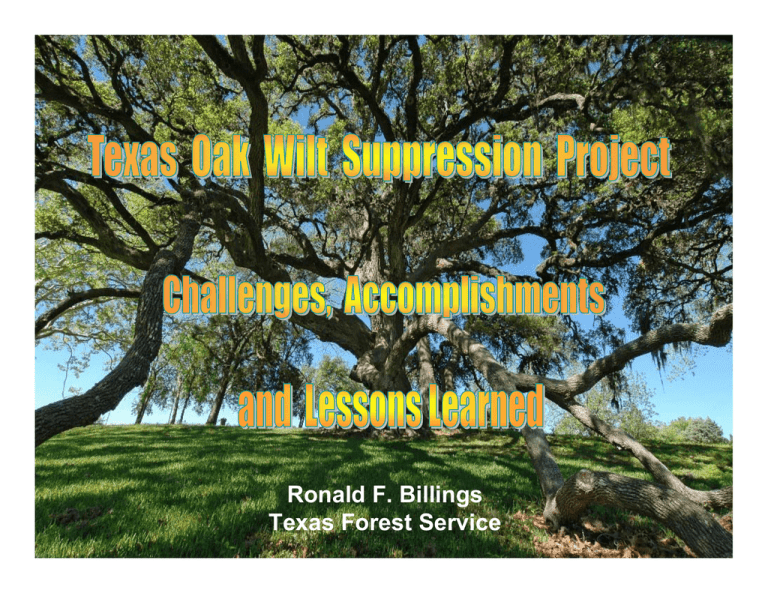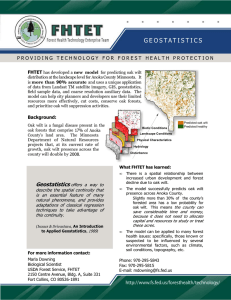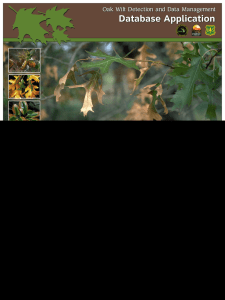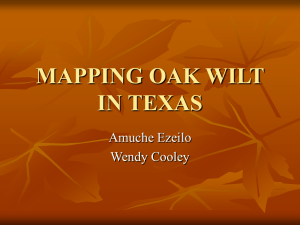Ronald F. Billings Texas Forest Service
advertisement

Ronald F. Billings Texas Forest Service Oak Wilt in Texas • Oak wilt first identified in Texas in Dallas in 1961 • Prior to mid-1970s, live oak mortality in Central Texas attributed to other causes Veinal necrosis on live oak • Live oaks and red (Spanish) oaks are most severely affected by oak wilt • Only red oaks produce fungal mats • Most tree losses occur from pathogen spread through connected root systems (common in live oaks) or root grafts. Oak wilt fungal mat on red oak Distribution of Oak Wilt in Texas • 56 counties in Central Texas Fort Worth Dallas College Station • 6 counties in West Texas Austin San Antonio Houston Counties in Texas with oak wilt cover an area larger than VT, NH, MA, CT, NJ, RI and MD combined. Texas Oak Wilt Suppression Project Since 1988 Texas Oak Wilt Suppression Project Background • Initiated in 1988, by TFS & City of Austin following a 5-year federal:state Oak Wilt Demonstration Project Texas Oak Wilt Suppression Project Background • Initiated in 1988, by TFS & City of Austin following a 5-year federal:state Oak Wilt Demonstration Project • U.S. Congressman Jake Pickle was instrumental in providing initial federal funding Texas Oak Wilt Suppression Project Background • Initiated in 1988, by TFS & City of Austin following a 5-year federal:state Oak Wilt Demonstration Project • U.S. Congressman Jake Pickle instrumental in providing federal funding • Initial suppression efforts limited to Hood, Travis, and Kendall counties Texas Oak Wilt Suppression Project Background • Initiated in 1988, by TFS & City of Austin following a 5-year federal:state Oak Wilt Demonstration Project • U.S. Congressman Jake Pickle instrumental in providing federal funding • Initial suppression efforts limited to Hood, Travis, and Kendall counties • TFS staff in 1988 = one forester in Austin, urban foresters in Fort Worth and San Antonio. Oak Wilt in Texas (Initial Perception = Small problem, easy to contain) Oak Wilt in Texas: Actual Situation (A Huge Problem) Oak Wilt Project - TFS Staff Foresters in Central Texas 2007 VACANT James Houser Oak Wilt Technical Coordinator Austin Jim Rooni Regional Forester, Austin 10 Carrie Atchison Granbury Renee Burks Meridian Rob Grotty Austin Eric Beckers Austin Vacant Robert Edmonson Johnson City Mark Duff Kerrville Daniel Lewis La Grange Urban Forester San Antonio Each TFS Forester is Responsible for Multiple Counties January 2004 Dr. David Appel, Texas A&M University Forest Pathologist Provides Technical Expertise Oak Wilt Technical Advisory Board • Dr. Dave Appel, TAMU • Jim Rooni, TFS • Dr. Brad Barber, TFS • Emsud Horosovic, City of Round Rock • Dr. Ron Billings, TFS • Billy Kniffen, Hays County Extension • Carrie Burns, City of Lakeway • Dr. Forrest Oliveria, US Forest Service • James Houser, TFS • Curt Randa, City of Cedar Park • Jay Culver, City of Austin • Dale Starkey, US Forest Service • Gene Gehring, Arborist • Damon Waitt, L.B. J. Wildflower Center • Jordy Hagen, Arborist • Dr. Dan Wilson, US Forest Service Project Objectives • Public awareness • Detection and evaluation • Technical assistance to landowners • Cost shares for oak wilt control • Train oak wilt specialists • Develop and implement strategic plan Increase Public Awareness of Oak Wilt Deal One-on-one with Affected Property Owners Partnerships and Cooperation • LBJ Wildflower Center • Houston Advanced Research Center (NBII) • Cities of Austin, Lakeway • Master Gardeners/Master Naturalists • ISA Certified Arborists Oak Wilt Web Page Since 2003 A cooperative project involving: • Lady Bird Johnson Wildflower Center • Houston Advanced Research Center • National Biological Information Infrastructure • Texas Forest Service • USDA Forest Service, Forest Health Protection • ISA, Texas Chapter http://www.texasoakwilt.org/ http://www.texasoakwilt.org Over 19,000 page views and 79,000 hits in March 2007 46 Oak Wilt Vendors Listed on Web Page 38 Oak Wilt Certified Arborists Listed on Web Page ISA Certified Arborist Training • 66 trained in San Antonio in 2006 • 51 trained in Austin and Dallas in 2007 Master Gardener/Master Naturalists Prevention Systemic fungicides are available to protect individual trees from oak wilt, but these do not stop tree-to-tree spread. State-of-the-art GIS and Data Management Systems DOQQ Photo Maps of Treatments Barrier Treatments • In live oak motts, expanding oak wilt centers may spread through interconnected root systems up to 100 feet per year. • Trenching (at least 4 feet deep) is required to halt oak wilt spread through interconnected root systems • Roguing (removal of diseased trees within the trenched area) is recommended in rural areas Most Common Trenching Equipment in Texas Ripper Bar Rock Saw Back Hoe 52- or 60-inch Rock Saw Texas –sized Trencher Centers trenched = 2,466 Feet of trench = 3.4 Million Feet (665 miles) Total cost shares = $ 2,461,758 Total costs = $ 6,005,645 Average cost/foot = $1.71 Feet of Cost-shared Trench by County 1988 - 2007 43 Counties S u bu rb Ur R es an ba . n 7% 14% R u ra l 35% R u ra l 44% 0 500 1,000 1,500 2,000 Feet x 1,000 Total = 3.4 million feet (648 miles) Cost/Foot of Trenches by Land Use Texas Oak Wilt Suppression Project FY01 FY02 FY03 FY04 FY05 FY06 FY 07 $25.00 $22.45 $20.00 $15.00 10.85 $10.00 $7.95 $5.00 3.21 $3.28 $0.00 Urban Suburban Rural Res. Land Use Classification Rural Non-Res. Long-range Strategic Plan • Pursue integrated approach to pest management • Identification of priority areas, partnerships • Empower more cities & communities to address oak wilt • Involve and train volunteer groups to assist with Project goals • Plant resistant trees; diversify landscapes • Increase state funding About Oak Wilt • Oak wilt impact has increased with a rapidlyincreasing population, property fragmentation, and urban sprawl. About Oak Wilt • Oak wilt impact has increased with a rapidlyincreasing population, property fragmentation, and urban sprawl. About Oak Wilt • Oak wilt incidence has increased with a rapidly-increasing population, property fragmentation, and urban sprawl. • Trench depth, placement, and tree removal inside trenched area are critical to success. About Oak Wilt • Oak wilt incidence has increased with a rapidly-increasing population, property fragmentation, and urban sprawl. • Trench depth, placement, and tree removal inside trenched area are critical to success. • Trenches to 4 feet depth are effective in halting oak wilt spread, but failure (breakout) is always an option. About Oak Wilt • Oak wilt incidence has increased with a rapidly-increasing population, property fragmentation, and urban sprawl. • Trench depth, placement, and tree removal inside trenched area are critical to success. • Trenches to 4 feet depth are effective in halting oak wilt spread, but failure (breakout) is always an option. • Most breakouts occur within 2 years, but some may appear 10-12 years later. About Oak Wilt Management • Oak wilt is a people problem and public education is never ending. About Oak Wilt Management • Oak wilt is a people problem and public education is never ending. • Neighborhoods have developed unique methods for combating oak wilt. About Oak Wilt Management • Oak wilt is a people problem and public education is never ending. • Neighborhoods have developed unique methods for combating oak wilt • Partnerships are the key. About Oak Wilt Management • Oak wilt is a people problem and public education is never ending. • Neighborhoods have developed unique methods for combating oak wilt • Partnerships are the key. • A holistic, stewardship approach is best. No Silver Bullet for Oak Wilt The Texas Chapter, International Society of Arboriculture presents June 4 - 7, 2007 Hilton Hotel Austin, Texas Conclusion With the proper staff, dedication, resources, partnerships, knowledge, and long-term commitment, anything can be accomplished. The Texas Cooperative Oak Wilt Suppression Project is proof of that! Oak Wilt Management Stewardship Woodlands Protection Initiative Fire Prevention Watershed Protection


